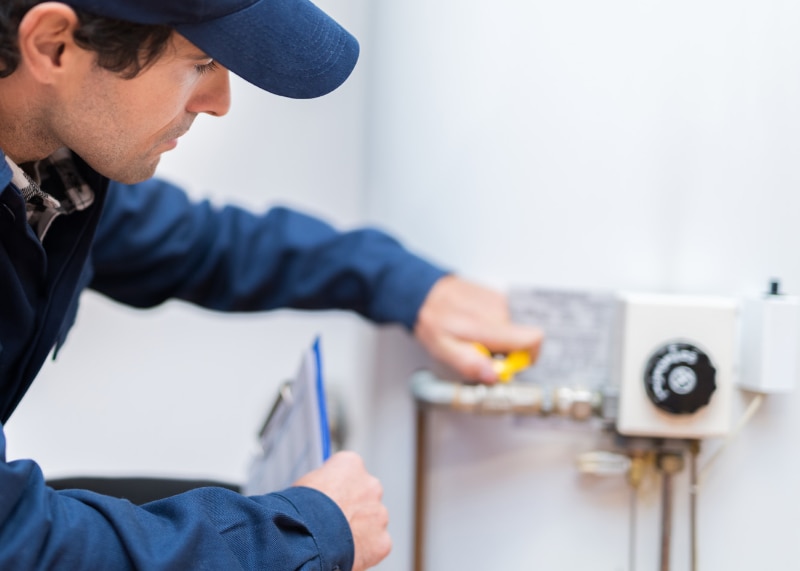Spotting Common Heater Problems
Spotting Common Heater Problems
Blog Article
Everybody is bound to have their personal idea about Common Problems with Tank Water Heaters.

Think of beginning your day without your regular hot shower. That already sets an inadequate tone for the rest of your day.
Every house requires a reliable hot water heater, but just a few understand exactly how to take care of one. One easy way to keep your water heater in top shape is to check for faults frequently and also repair them as quickly as they appear.
Remember to switch off your water heater prior to sniffing about for mistakes. These are the water heater faults you are more than likely to experience.
Water as well hot or also cool
Every water heater has a thermostat that establishes how hot the water obtains. If the water entering into your house is too hot in spite of establishing a hassle-free optimum temperature level, your thermostat could be faulty.
On the other hand, too cold water may be due to a failed thermostat, a broken circuit, or improper gas flow. For example, if you make use of a gas hot water heater with a busted pilot burner, you would get cold water, even if the thermostat remains in best condition. For electric heating systems, a blown fuse might be the offender.
Insufficient hot water
Hot water heater come in several dimensions, depending on your warm water demands. If you lack hot water prior to everyone has actually had a bath, your water heater is also small for your family size. You ought to consider setting up a bigger hot water heater storage tank or choosing a tankless water heater, which occupies less space and is much more resilient.
Strange sounds
There are at least 5 kinds of noises you can speak with a hot water heater, yet one of the most common interpretation is that it's time for the water heater to retire.
To start with, you must know with the regular seems a hot water heater makes. An electric heating unit may sound different from a gas-powered one.
Standing out or banging audios generally indicate there is a slab of sediment in your containers, and also it's time to clean it out. On the other hand, whistling or hissing sounds might just be your valves letting some pressure off.
Water leakages
Leaks can originate from pipelines, water connections, shutoffs, or in the worst-case situation, the container itself. Gradually, water will wear away the tank, and also find its way out. If this happens, you need to change your water heater immediately.
Nonetheless, before your adjustment your entire tank, make sure that all pipelines remain in place and that each shutoff functions flawlessly. If you still need assistance recognizing a leakage, call your plumber.
Rust-colored water
Rust-colored water indicates one of your hot water heater components is worn away. It could be the anode rod, or the tank itself. Your plumber will certainly have the ability to identify which it is.
Warm water
Despite how high you established the thermostat, you won't get any kind of warm water out of a heating unit well past its prime. A hot water heater's effectiveness might lower with time.
You will likewise obtain lukewarm water if your pipes have a cross link. This indicates that when you turn on a faucet, warm water from the heater moves in together with regular, cold water. A cross link is easy to place. If your hot water taps still run after closing the water heater shutoffs, you have a cross link.
Discoloured Water
Rust is a significant reason for dirty or discoloured water. Rust within the water tank or a stopping working anode pole could cause this discolouration. The anode rod shields the tank from rusting on the inside as well as must be examined yearly. Without a rod or an appropriately operating anode pole, the warm water promptly wears away inside the tank. Contact a professional water heater technician to determine if changing the anode pole will certainly fix the issue; otherwise, change your water heater.
Conclusion
Ideally, your water heater can last ten years prior to you need a modification. However, after the 10-year mark, you may experience any of these mistakes much more on a regular basis. At this moment, you should include a new hot water heater to your budget.
How To Troubleshoot 3 Common Water Heater Problems in Twin Cities
The Water Heater Is Leaking
A leaky cold water inlet valve A loose pipe fitting A leaky temperature and pressure relief valve A corroded anode rod A cracked tank Turn Off Your Water Heater:
Shut off your gas water heater by turning the gas valve on the unit to the “OFF” position. Shut off your electric water by switching its power off at your electrical panel. Look for a two-pole breaker labeled “water heater” and turn it to the “OFF” position. Move the ball valve connected to the water heater to be perpendicular to the piping at a 90° angle. Look for the Leak:
Depending on whether the water is coming from the tank's top or bottom, you’ll want to look for the leak in different locations.
If the leak comes from the top of the tank, carefully look for water escaping from the cold water inlet valve or loose pipe fittings. Rusted hot and cold water valves can have loose connections with the tank, with water leaking out of them.
https://mspplumbingheatingair.com/blog/how-to-troubleshoot-3-common-water-heater-problems
As a keen reader about Water Heater Repair and Troubleshooting, I think sharing that piece of content was really helpful. Sharing is nice. Helping others is fun. Many thanks for your time. Kindly come by our blog back soon.
Maintenance Sign-Up Report this page